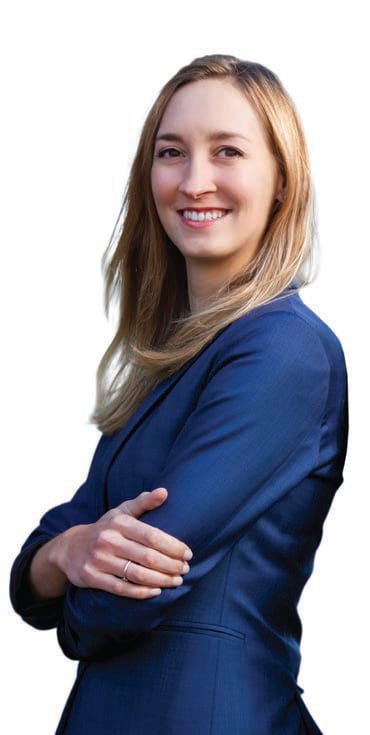How Berkeley Haas is accelerating blockchain’s potential
What is Blockchain?
Blockchain is essentially a database designed to be transparent and secure. It can store many types of records, including cryptocurrency (like bitcoin), assets, contracts, data, identity, and more. It’s also a distributed ledger. There is no central storage repository; rather, records are kept in widely scattered networks of devices that all instantly register changes to the database.

You might call Ian Lee, MBA 10, a blockchain innovator. As a management consultant and venture capitalist in the early part of the decade, Lee got immersed in the then-arcane world of bitcoin and blockchain, the revolutionary technology that underlies digital money. From 2014 to 2017, he led Citigroup’s blockchain and cryptocurrency initiatives as part of its ventures division, Citi Ventures. In 2015, he helped IDEO launch CoLab, the research and development arm of the global product design firm, where he now works as an executive in residence and explores uses of blockchain that are taking it far beyond its original cryptocurrency milieu–everything from instant global money transfers to digital copyright management.
It’s like 1999 all over again, when the world was promised that the internet would deliver not only convenient shopping and financial services, but also wisdom, tolerance, and democracy. Lee and the growing ranks of blockchain enthusiasts are convinced this new technology will change the world.
“We characterize this as the beginning of the distributed web–a more decentralized internet,” Lee says. “Not only will it create new services and marketplaces, but it also has the potential to create new kinds of human and user experiences.”
Now Lee has another mission–to make UC Berkeley, and Haas in particular, a world-class center for research and teaching on blockchain, cryptocurrency, and related distributed-web technologies. Lee was the catalyst behind a wildly successful interdisciplinary blockchain class this spring, and he regularly returns to Haas to teach and lecture. “Blockchain fits at the unique intersection of business, law, technology, and engineering, and no business school is better positioned to explore all of these interconnections than Haas and UC Berkeley,” he says.
The business school is taking a big leap to realize this vision through the University Blockchain Research Initiative, a program funded by Ripple, a fast-growing San Francisco company that uses blockchain to move money globally. Haas is one of 17 academic institutions on five continents–and one of only two business schools–to win a multimillion dollar, five-year grant from Ripple to support faculty and student research on blockchain, cryptocurrency, and payment systems, as well as applied learning opportunities and events such as conferences, competitions, and guest speakers.
“Ripple chose to partner with us because of the breadth and depth of activity that’s already underway–both at Haas and throughout the Berkeley campus,” says Interim Dean Laura Tyson. “It comes at a perfect time, as students across campus are demanding even more classes, research opportunities, and activities related to blockchain.”
Haas’ new blockchain program will be housed in the school’s Institute for Business & Social Impact and work closely with the Berkeley Master of Financial Engineering Program. The grant was announced in June, and IBSI is in the process of engaging a part-time faculty director and a program manager to oversee it.
Blockchain Demystified
For all of the talk about blockchain, there’s still a lot of confusion as to what it actually is. Blockchain technology is an electronic record-keeping system first used to track exchanges of bitcoin and other digital money. Much of the buzz surrounding blockchain reflects the fact that bitcoin–once the province of a handful of cultists–became one of the fastest-appreciating assets in investment history, rocketing in value from 30 cents in 2011 to a high of almost $20,000 last December before slipping to some $8,000 later this past July.
“Not only will [blockchain] create new services and marketplaces, but it also has the potential to create new kinds of human and user experiences.”
–Ian Lee, MBA 10
But excitement also runs wild because blockchain represents a radical departure from conventional database technology, which many see as eventually replacing much of the web as we now know it. Most systems now store records of anything from bank transactions to video clips on computer servers in faraway data centers. By contrast, blockchain is a distributed ledger with no centralized storage. Records are kept in widely scattered networks of devices. This means no central silo could be hacked, as it was in the Equifax and Target scandals.
In a blockchain system, every change to the database registers instantly throughout the grid, meaning everyone in the network can see everything as it’s recorded. In addition, blockchain uses cryptography to provide supposedly fail-safe identification of every participant and every transaction. In principle, these features mean no one can tamper with the data without getting caught. “If you try to do anything, the world can see you,” says Doug Galen, MBA 88, co-founder and CEO of RippleWorks, a private foundation with ties to Ripple.

To devotees, blockchain’s built-in decentralization distributes power more democratically than traditional technologies. What’s more, since blockchain links users directly to each other, powerful middlemen may not be needed–raising visions of money transfers without PayPal or any proprietary platform, for example.
Indeed, enthusiasm for blockchain is in part a reaction to the failings of the internet–widespread false information, hacking, privacy concerns, and the like. The idea of peer-to-peer digital currency, for example, sprang from the financial crisis of 2008–a way to reimagine the opaque financial system as a transparent network where people control their own assets.
Democratizing visions aside, some of the world’s biggest and most powerful institutions are staking out positions in blockchain. Worldwide business spending on the technology will soar from $945 million in 2017 to $9.7 billion in 2021, according to the research firm International Data Corporation. For example, Microsoft is preparing to use blockchain to track video game rights and royalties. And a consortium of automakers recently launched the Mobility Open Blockchain Initiative, one of the largest industry-specific blockchain consortia (representing more than 80 percent of global auto manufacturing by volume), to develop applications ranging from peer-to-peer ridesharing to tracking of auto parts through the supply chain. Ashley Lannquist, MBA 18, co-founded the initiative as a student and co-directs it.
Berkeley Haas and Blockchain
In the burgeoning world of blockchain and crypto-currency, many alumni have already established themselves as leaders–including Galen of RippleWorks; Phillip Gillespie, MFE 10, who heads the Tokyo operations of international cryptocurrency brokerage B2C2; and Devadutta Ghat, EMBA 15, who is using blockchain technology to create a decentralized video distribution network.
Alumnus Lee approached faculty at Haas, the School of Law, and the College of Engineering in 2016 with a novel idea: collaborate across disciplines to launch blockchain programs. One result was this spring’s Blockchain, Cryptoeconomics, and the Future of Technology, Business, and Law. The pioneering interdisciplinary course, taught by Haas Lecturer Gregory La Blanc; Adam Sterling, MBA/JD 13, executive director of the Berkeley Center for Law and Business; and Professor Dawn Song and postdoc Raymond Cheng of the Department of Electrical Engineering and Computer Sciences, was a runaway success.
Faculty members, several of whom are on the cutting edge of fintech research, are examining the volatile cryptocurrency market, as well as blockchain more generally, from a variety of disciplines. Finance Prof. Christine Parlour is studying how changes in payment systems may affect bank stability and the broader economy. In a new working paper she analyzed pricing and returns on 222 digital coins–which can now be incorporated into portfolios or traded like any other asset. She is also developing a new FinTech Center, which will be a focal point for leading-edge research. Prof. Paul Gertler is look-ing at how digital payments can increase financial inclusion in developing economies–where blockchain technology may play an important role.
In the MFE program, student teams are working on blockchain technology projects with corporate clients, including a strategy for trading cryptocurrencies. The program is scheduling Q&A sessions with multiple alumni who have launched crypto startups, and a new seminar is planned for fall.
Berkeley Executive Education, in partnership with the Berkeley Center for Law and Business, offered a Blockchain Unlocked program in early August. It was one of the first in-person executive education blockchain programs in the world based in a major university. Lannquist co-founded and initiated the program and has lectured in it, alongside students in the Blockchain at Berkeley organization.
All this is part of a wave washing over the wider Berkeley community. More than 7,400 students have signed up for Blockchain Fundamentals, an online version of a course developed by Blockchain at Berkeley students. Among Haas students, the Haas FinTech Club, with Lannquist serving as co-president for three terms, became a center of blockchain activity and innovation in financial technology. Lannquist brought in guest lecturers to educate fellow Haas students and started a blog (now with some 2,000 followers) in response to classmates seeking to better understand blockchain.
There’s no denying that an element of fad and hype surrounds blockchain. Some say the changes it will bring will be as important–or more important–than the web itself. So far, blockchain hasn’t made the world a better place, but it has helped a handful of people get very rich.
“Is there a blockchain bubble? Probably,” says Brett Green, an assistant finance professor. “We have to think hard about what kinds of problems blockchain can solve and what it might not be very good at solving.”
We don’t know the answer to that question yet. But one thing is certain–research and teaching at Haas and within the broader Berkeley community will play an important part in solving that puzzle.
Blockchain Champions
Haas alumni influencing blockchain’s evolution
Blockchain for Good

Doug Galen, MBA 88
Doug Galen is making the catchphrase “blockchain for good” more than just rhetoric. As CEO of RippleWorks, a private foundation with ties to Ripple, he oversees programs that connect leading expertise from the U.S. tech sector with social ventures for short-term, high-impact projects. He recently led a research initiative at Stanford University on blockchain applications dedicated for social good as part of his faculty role at the Graduate School of Business. “Thirty percent of foreign aid is lost to corruption or other forces,” Galen says. “Imagine if we had absolute transparency and could ensure 100 percent of the money went to the intended people.”
Global Blockchain Ventures

Ashley Lannquist, MBA 18
Ashley Lannquist became a blockchain player even before earning her Haas MBA. For a course sponsored by Blockchain at Berkeley, she managed her own bitcoin investment portfolio. The profits paid her MBA tuition. She later scored a consulting assignment with automaker BMW that led to a key role organizing a consortium of automakers exploring uses of blockchain in that industry. Now, Lannquist is project lead for blockchain and distributed ledger technology in the San Francisco office of the World Economic Forum. She also presents at blockchain conferences worldwide. “Blockchain isn’t always efficient or safe enough to be used for everything it’s been advertised for,” she notes. “But industry by industry, we’ll see applications.”
Cash for Digital Currency

Phillip Gillespie, MFE 10
A big challenge for blockchain-enabled cryptocurrency is turning digital currency into conventional money. Phillip Gillespie moved from managing foreign exchange trading for Goldman Sachs to running the Tokyo office of B2C2, a startup brokerage that provides cryptocurrency liquidity for large financial clients. Gillespie sees his role as providing advanced finance expertise in a field dominated by techies. “We believe cryptocurrency is not a fad,” he stresses. “It’s the formation of a new asset class.”
Distributed Video

Devadutta Ghat, EMBA 15
Devadutta Ghat has built video systems for some of the tech world’s largest companies and now is the CTO of VideoCoin Network, which is using blockchain and cryptocurrency to build a decentralized video streaming platform. VideoCoin lets content vendors tap into idle computer capacity around the world to store, process, and stream videos, lowering prices and fueling competition. Blockchain technology keeps track of services rendered and transactions between content creators and server providers. “Decentralized computing is the holy grail,” Ghat says. “We want to completely displace cloud computing centers.”
